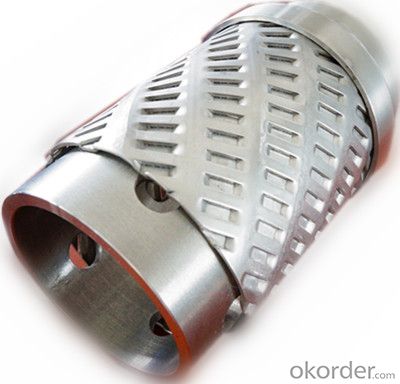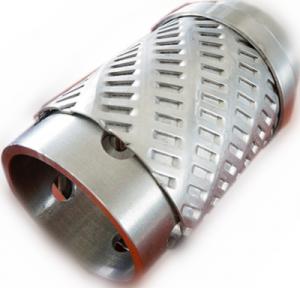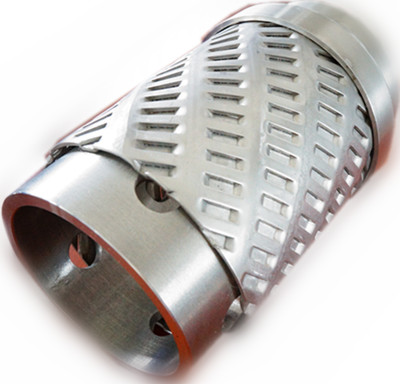Slotted Screen Liner
- Loading Port:
- Tianjin
- Payment Terms:
- TT OR LC
- Min Order Qty:
- -
- Supply Capability:
- 25000 m.t./month
OKorder Service Pledge
OKorder Financial Service
You Might Also Like

Product Descriptions :Slotted Screen Liner
| Product Name:Slotted | |
| | |
| Product No.:Screen | |
| Product Description | |
Product characteristics and advantages: 1. slotted tube J55 or N80 casing ontology processing, high strength, easy deformation 2. slit-edge squareness is good, smooth, Burr-free cutting edge and slit evenly. 3. is it flow area, twenty seven-eighths "screen 300 slot/1.5M, area of exceeding flowing is 72 per cubic centimeter, 2.4 times larger than the same specification tubing area of exceeding flowing times. Conducive to the flow of liquid. 4. in the inclined and horizontal well using the benefits more apparent. 5. whole embalmed in a dense protective layer on the surface of the screen, results in improved corrosion resistance and wear resistance of the screen, which can effectively extend the life of the underground work. 6. apply sand sand well sand control of particle size greater than 0.3mm. 7. the operation is simple, easy to use, in the path, string for easy configuration Main technical parameters of laser cutting on screen: Tube categories: casing, tubing; Conduit length (single): 15m; Pipe outside diameter: 50~500mm (length ≤ 15m), Wall thickness: ≤ 20mm; Crack width: (0.10~4) mm ± 0.03mm; Cloth sewing type: parallel, staggered, spiral; Axis table stitch: free. | |
Dalipal Company is one of the most famous enterprises of china professionally producing pipeline and oil casing.We can supply API 5CT series of pipeline and oil casing with all kinds of specifications and materials.We have first-class production equipment and technology.
- Q: What is the difference between nominal and actual pipe size?
- The nominal pipe size refers to the approximate inside diameter of a pipe, while the actual pipe size refers to the exact inside diameter. The nominal size is used for general identification purposes, while the actual size is more precise and is used for engineering calculations and pipe fittings.
- Q: How are steel pipes threaded for easy installation?
- Steel pipes are threaded for easy installation using a process called threading. Threading involves cutting grooves or ridges into the pipe to create a spiral pattern. This pattern allows the pipe to easily connect with other threaded components, such as fittings or valves. There are two common methods used to thread steel pipes: manual threading and machine threading. In manual threading, a handheld tool called a pipe die is used. The die is equipped with sharp teeth that cut into the pipe as it is rotated. The pipe is secured in a vise or held firmly by hand, and the die is applied to the end of the pipe. The die is then rotated around the pipe, creating the threaded grooves. This process requires skill and precision to ensure accurate and properly aligned threads. Machine threading, on the other hand, is a more automated process. It involves the use of a pipe threading machine, which is equipped with a die head that automatically cuts the threads into the pipe. The machine secures the pipe and rotates it while the die head moves along the length of the pipe, cutting the threads. Machine threading is faster and more efficient than manual threading, making it ideal for large-scale production or projects. Regardless of the method used, it is crucial to ensure that the threads are clean and free from debris or burrs. This is important for easy installation and to prevent leaks or other complications. After threading, the pipes are typically inspected to ensure the threads meet the required specifications. Threading steel pipes allows for easy installation as the threaded ends can be easily screwed into fittings, valves, or other pipes with compatible threads. This threaded connection creates a tight seal, making it suitable for various applications, such as plumbing, gas lines, or industrial piping systems.
- Q: Can steel pipes be used for water supply systems?
- Yes, steel pipes can be used for water supply systems. Steel pipes are commonly used in water distribution systems due to their strength, durability, and resistance to corrosion. However, it is important to ensure that the steel pipes are properly coated or lined to prevent rusting and contamination of the water supply. Regular maintenance and inspection are also crucial to ensure the longevity and safety of steel pipes in water supply systems.
- Q: What are the safety precautions while working with steel pipes?
- Some safety precautions while working with steel pipes include wearing appropriate personal protective equipment such as gloves, safety glasses, and steel-toed boots to prevent injuries. It is important to ensure the work area is clear of any obstacles or tripping hazards. Workers should be trained in proper lifting techniques to prevent strain or back injuries. Additionally, it is crucial to follow proper procedures for handling and storing steel pipes to prevent accidents and maintain a safe working environment.
- Q: How big is the seamless steel tube of DN50?
- DN refers to the nominal diameter, the outer diameter is 60.3mm
- Q: How do steel pipes resist corrosion?
- Steel pipes resist corrosion through a process called passivation, where a protective layer of chromium oxide forms on the surface of the steel, preventing direct contact with corrosive elements and slowing down the oxidation process. Additionally, steel pipes can be coated with protective layers such as zinc or epoxy to provide an extra barrier against corrosion.
- Q: What is the maximum pressure that steel pipes can handle?
- The maximum pressure that steel pipes can handle depends on various factors such as the grade and thickness of the steel, the diameter of the pipe, and the intended application. However, steel pipes are known for their high strength and durability, allowing them to withstand high pressure conditions. In general, steel pipes can handle pressures ranging from a few hundred PSI (pounds per square inch) to several thousand PSI, depending on the specific specifications and design considerations. It is crucial to consult engineering standards, industry guidelines, and relevant experts to determine the appropriate maximum pressure for a specific steel pipe.
- Q: What are the different grades of steel used in manufacturing pipes?
- The different grades of steel used in manufacturing pipes are typically categorized based on their chemical composition and mechanical properties. Some common grades include carbon steel, stainless steel, alloy steel, and duplex steel. Each grade has its own unique characteristics and is chosen based on the specific requirements of the application, such as corrosion resistance, strength, and temperature resistance.
- Q: What are the factors to consider while selecting steel pipes for a project?
- When selecting steel pipes for a project, some important factors to consider include the intended application or purpose of the pipes, the required strength and durability, the size and dimensions needed, the corrosion resistance requirements, the availability and cost, and any specific industry standards or regulations that need to be met.
- Q: How are steel pipes insulated to prevent heat loss?
- Steel pipes are typically insulated to prevent heat loss by wrapping them with insulation materials such as mineral wool, fiberglass, or foam. These insulation materials provide a barrier that traps heat within the pipes, preventing it from being lost to the surrounding environment. Additionally, pipes may also be covered with an outer protective layer, such as aluminum or PVC, to further enhance insulation and protect against external elements.
Send your message to us
Slotted Screen Liner
- Loading Port:
- Tianjin
- Payment Terms:
- TT OR LC
- Min Order Qty:
- -
- Supply Capability:
- 25000 m.t./month
OKorder Service Pledge
OKorder Financial Service
Similar products
Hot products
Hot Searches
Related keywords


















